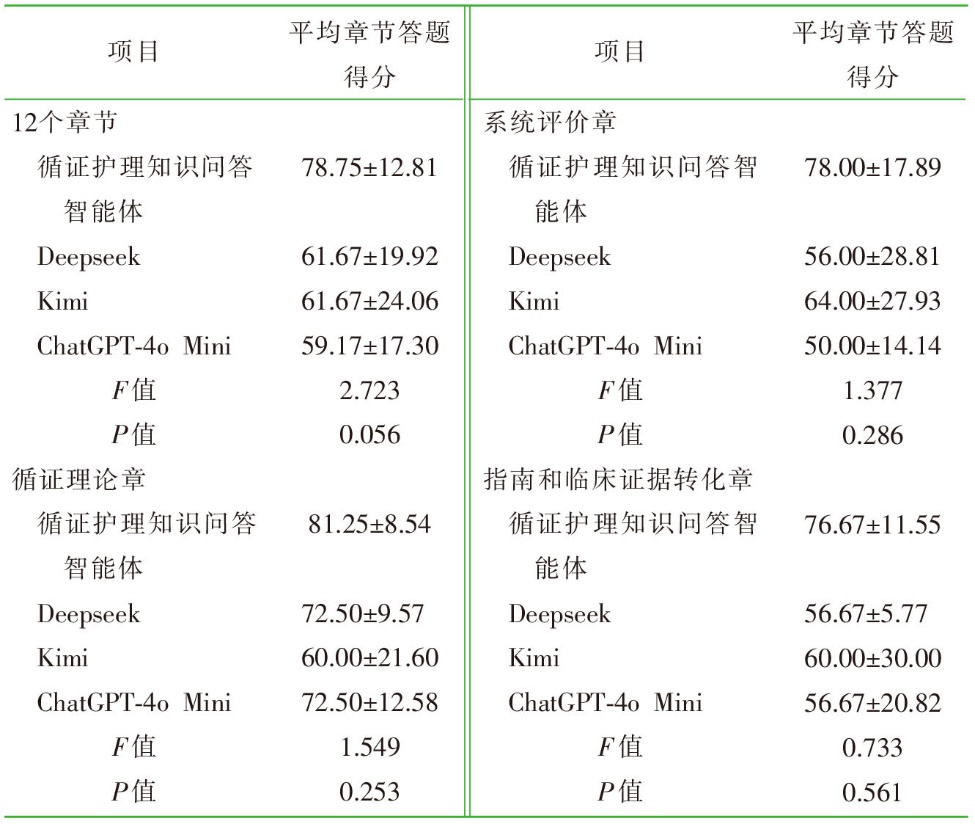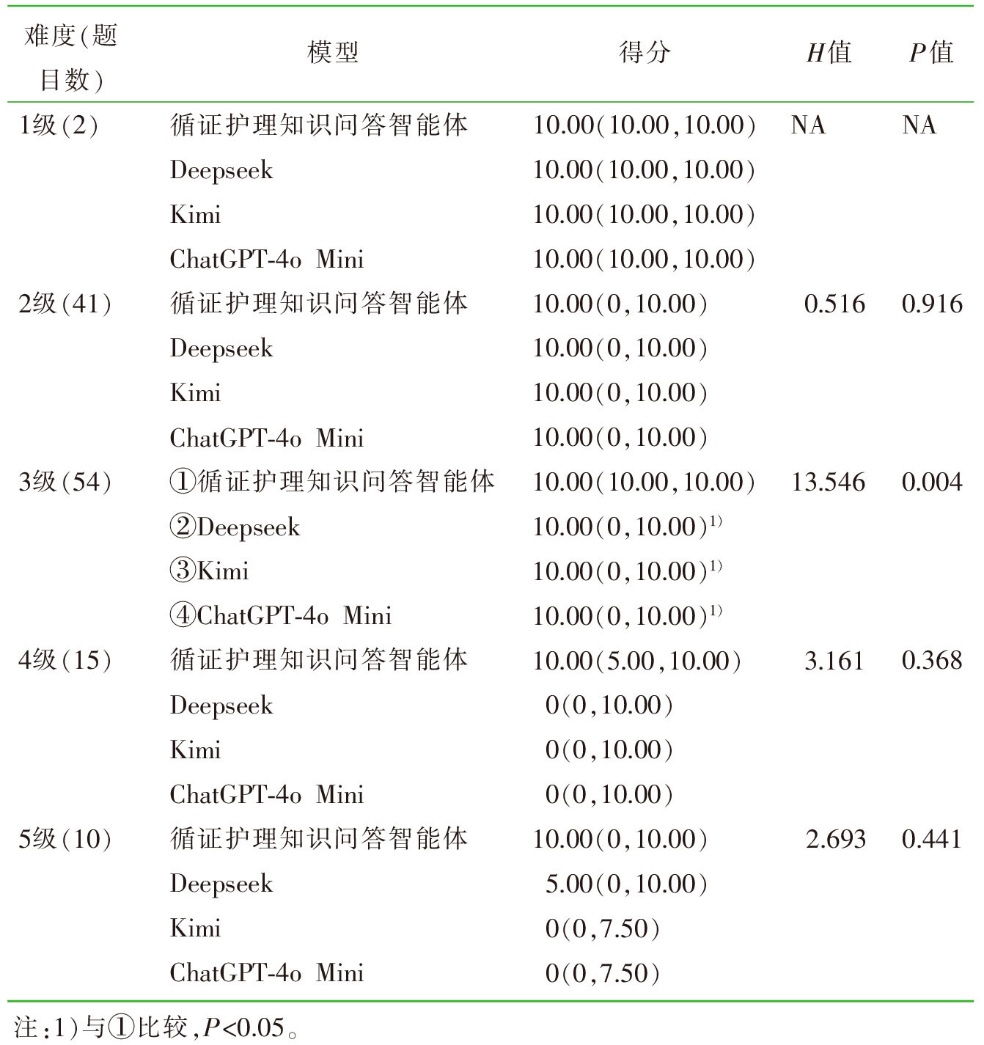| [1] |
胡雁, 周英凤. 循证护理实践从入门到进阶[M]. 上海: 复旦大学出版社,2024:3-4.
|
| [2] |
李彩霞, 邢唯杰, 李铮, 等. 本科护理学专业学生循证护理教学现状与思考[J]. 中华医学教育杂志, 2018, 38(2):197-202.
|
|
Li CX, Xing WJ, Li Z, et al. Status quo and thinking of evidence-based nursing education in undergraduate nursing students[J]. Chin J Med Educ, 2018, 38(2):197-202.
|
| [3] |
李琪, 马俊伟, 赵义妹, 等. 循证护理理念在我国护理学专业教育领域应用现状的可视化分析与展望[J]. 中华医学教育杂志, 2021, 41(2):109-112.
|
|
Li Q, Ma JW, Zhao YM, et al. Visual analysis and prospect of the application of evidence-based nursing concept in nursing education in China[J]. Chin J Med Educ, 2021, 41(2):109-112.
|
| [4] |
Bedi S, Liu YT, Orr-Ewing L, et al. Testing and evaluation of health care applications of large language models:a systematic review[J]. JAMA, 2025, 333(4):319-328.
|
| [5] |
Dash D, Thapa R, Banda J, et al. Evaluation of GPT-3.5 and GPT-4 for supporting real-world information needs in healthcare delivery[EB/OL]. [2025-03-31]. https://arxiv.org/abs/2304.13714.
|
| [6] |
Woodnutt S, Allen C, Snowden J, et al. Could artificial intelligence write mental health nursing care plans?[J]. J Psychiatr Ment Health Nurs, 2024, 31(1):79-86.
|
| [7] |
汤志杰, 孙国珍, 李芸霞, 等. 大语言模型在护理领域应用的机遇与挑战[J]. 中国护理管理, 2024, 24(6):929-933.
|
|
Tang ZJ, Sun GZ, Li YX, et al. Opportunities and challenges of applying large language model in nursing field[J]. Chin Nurs Manag, 2024, 24(6):929-933.
|
| [8] |
杨淑琪, 朱政, 王佳清, 等. 基于证据的医疗生成式人工智能大语言模型的构建和应用进展[J]. 护士进修杂志, 2025, 40(12):1317-1325.
|
|
Yang SQ, Zhu Z, Wang JQ, et al. Construction and application progress of evidence-based medical generative AI large language models[J]. J Nurses Train, 2025, 40(12):1317-132
|
| [9] |
王绍源, 杨东航, 任宇东. 大语言模型在护理领域的应用场景与伦理探讨[J]. 护理学杂志, 2025, 40(5):108-113.
|
|
Wang SY, Yang DH, Ren YD. Application and ethical considerations of large language models in nursing[J]. J Nurs Sci, 2025, 40(5):108-113.
|
| [10] |
Ji ZW, Lee N, Frieske R, et al. Survey of hallucination in natural language generation[J]. ACM Comput Surv, 2023, 55(12):1-38.
|
| [11] |
Rawte V, Sheth A, Das A. A survey of hallucination in large foundation models[EB/OL]. [2025-03-31]. https://arxiv.org/abs/2309.05922.
|
| [12] |
Manakul P, Liusie A, Gales M. SelfCheckGPT:zero-resource black-box hallucination detection for generative large language models[EB/OL]. [2025-03-31]. https://arxiv.org/abs/2303.08896.
|
| [13] |
Yang S, Jing M, Wang S, et al. Exploring large language models in healthcare:insights into corpora sources,customization strategies,and evaluation metrics[EB/OL]. [2025-03-31]. https://arxiv.org/abs/2502.11861.
|
| [14] |
胡雁, 郝玉芳. 循证护理学[M]. 2版. 北京: 人民卫生出版社,2018:1-511.
|
| [15] |
Lewis P, Perez E, Piktus A, et al. Retrieval-augmented generation for knowledge-intensive NLP tasks[EB/OL]. [2025-03-31]. https://arxiv.org/abs/2005.11401.
|
| [16] |
张鹤译, 王鑫, 韩立帆, 等. 大语言模型融合知识图谱的问答系统研究[J]. 计算机科学与探索, 2023, 17(10):2377-2388.
doi: 10.3778/j.issn.1673-9418.2308070
|
|
Zhang HY, Wang X, Han LF, et al. Research on question answering system on joint of knowledge graph and large language models[J]. J Front Comput Sci Technol, 2023, 17(10):2377-2388.
doi: 10.3778/j.issn.1673-9418.2308070
|
| [17] |
Peng RL, Liu K, Yang P, et al. Embedding-based retrieval with LLM for effective agriculture information extracting from unstructured data[EB/OL]. [2025-03-31]. https://arxiv.org/abs/2308.03107.
|
| [18] |
Acosta JN, Falcone GJ, Rajpurkar P, et al. Multimodal biomedical AI[J]. Nat Med, 2022, 28(9):1773-1784.
doi: 10.1038/s41591-022-01981-2
pmid: 36109635
|
| [19] |
Lipkova J, Chen RJ, Chen B, et al. Artificial intelligence for multimodal data integration in oncology[J]. Cancer Cell, 2022, 40(10):1095-1110.
doi: 10.1016/j.ccell.2022.09.012
pmid: 36220072
|
| [20] |
李钥, 淮盼盼, 杨辉. ChatGPT在护理教育中的应用状况及优劣分析[J]. 护理学杂志, 2023, 38(21):117-121.
|
|
Li Y, Huai PP, Yang H. Application of ChatGPT in nursing education and its advantages and disadvantages:a review[J]. J Nurs Sci, 2023, 38(21):117-121.
|
| [21] |
Karabacak M, Ozkara BB, Margetis K, et al. The advent of generative language models in medical education[J]. JMIR Med Educ, 2023,9:e48163.
|
| [22] |
Lee H. The rise of ChatGPT:exploring its potential in medical education[J]. Anat Sci Educ, 2024, 17(9):926-931.
|











